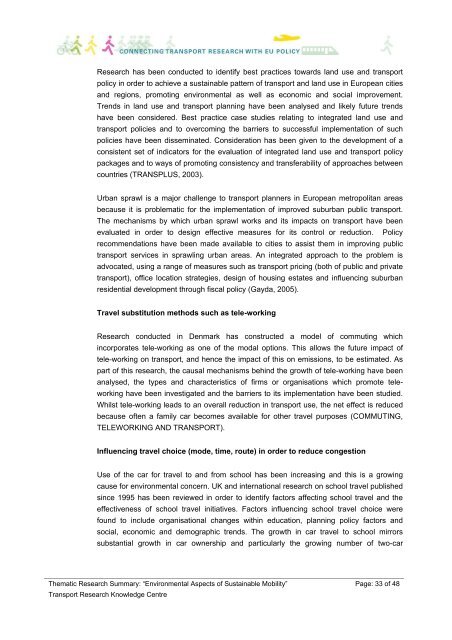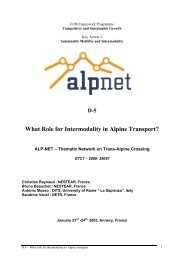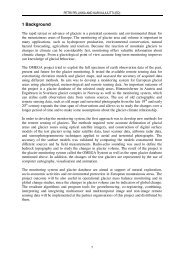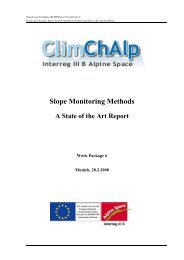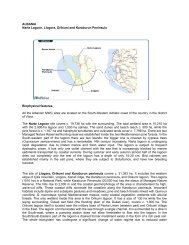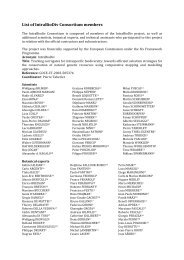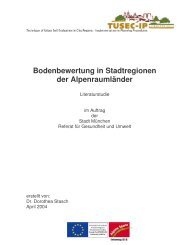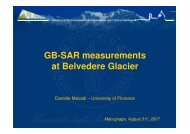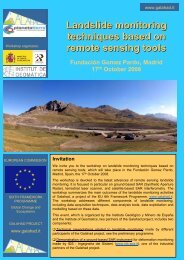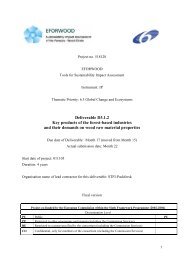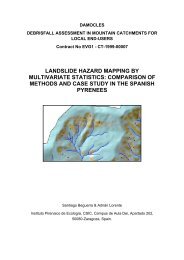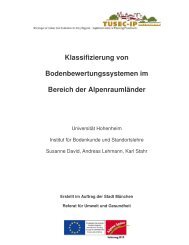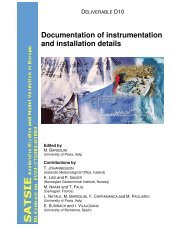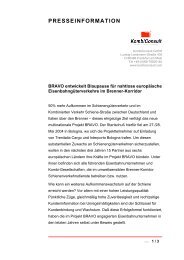Environmental Aspects of Sustainable Mobility - Transport Research ...
Environmental Aspects of Sustainable Mobility - Transport Research ...
Environmental Aspects of Sustainable Mobility - Transport Research ...
You also want an ePaper? Increase the reach of your titles
YUMPU automatically turns print PDFs into web optimized ePapers that Google loves.
<strong>Research</strong> has been conducted to identify best practices towards land use and transportpolicy in order to achieve a sustainable pattern <strong>of</strong> transport and land use in European citiesand regions, promoting environmental as well as economic and social improvement.Trends in land use and transport planning have been analysed and likely future trendshave been considered. Best practice case studies relating to integrated land use andtransport policies and to overcoming the barriers to successful implementation <strong>of</strong> suchpolicies have been disseminated. Consideration has been given to the development <strong>of</strong> aconsistent set <strong>of</strong> indicators for the evaluation <strong>of</strong> integrated land use and transport policypackages and to ways <strong>of</strong> promoting consistency and transferability <strong>of</strong> approaches betweencountries (TRANSPLUS, 2003).Urban sprawl is a major challenge to transport planners in European metropolitan areasbecause it is problematic for the implementation <strong>of</strong> improved suburban public transport.The mechanisms by which urban sprawl works and its impacts on transport have beenevaluated in order to design effective measures for its control or reduction. Policyrecommendations have been made available to cities to assist them in improving publictransport services in sprawling urban areas. An integrated approach to the problem isadvocated, using a range <strong>of</strong> measures such as transport pricing (both <strong>of</strong> public and privatetransport), <strong>of</strong>fice location strategies, design <strong>of</strong> housing estates and influencing suburbanresidential development through fiscal policy (Gayda, 2005).Travel substitution methods such as tele-working<strong>Research</strong> conducted in Denmark has constructed a model <strong>of</strong> commuting whichincorporates tele-working as one <strong>of</strong> the modal options. This allows the future impact <strong>of</strong>tele-working on transport, and hence the impact <strong>of</strong> this on emissions, to be estimated. Aspart <strong>of</strong> this research, the causal mechanisms behind the growth <strong>of</strong> tele-working have beenanalysed, the types and characteristics <strong>of</strong> firms or organisations which promote teleworkinghave been investigated and the barriers to its implementation have been studied.Whilst tele-working leads to an overall reduction in transport use, the net effect is reducedbecause <strong>of</strong>ten a family car becomes available for other travel purposes (COMMUTING,TELEWORKING AND TRANSPORT).Influencing travel choice (mode, time, route) in order to reduce congestionUse <strong>of</strong> the car for travel to and from school has been increasing and this is a growingcause for environmental concern. UK and international research on school travel publishedsince 1995 has been reviewed in order to identify factors affecting school travel and theeffectiveness <strong>of</strong> school travel initiatives. Factors influencing school travel choice werefound to include organisational changes within education, planning policy factors andsocial, economic and demographic trends. The growth in car travel to school mirrorssubstantial growth in car ownership and particularly the growing number <strong>of</strong> two-carThematic <strong>Research</strong> Summary: “<strong>Environmental</strong> <strong>Aspects</strong> <strong>of</strong> <strong>Sustainable</strong> <strong>Mobility</strong>” Page: 33 <strong>of</strong> 48<strong>Transport</strong> <strong>Research</strong> Knowledge Centre


